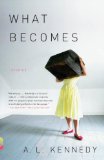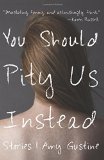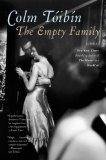Summary | Excerpt | Reviews | Beyond the book | Read-Alikes | Genres & Themes | Author Bio

Stories
by A.L. KennedyTowards the end of the title story in this bleak yet bracing collection, a man delivers a haunting interior monologue about how people cope, or fail to cope, with loss: "Our town is full of people running back and forth in torn days and every other town is like that, too. Our world is thick with it, clotted in patterns and patterns of grief." In the remaining eleven stories, A.L. Kennedy goes on to depict such towns, such characters, all dealing in their own complex and eccentric ways with despair, longing, and the occasional glimpses of love that enter their lives. To the author's fans, none of this will come as a surprise, but the short story format does provide a more palatable way of absorbing Kennedy's pitiless worldview than do her novels, which can become nearly overbearing in their focus on human frailty and breakage.
Kennedy's trademark fascination with violence, both physical and psychological, animates these stories in alternately bold and subtle guises: the literal bloodshed in "What Becomes" and "Story of My Life" complements the romantic heartbreak in "Edinburgh" and "Sympathy." The violence that couples perpetrate against each other ("Confectioner's Gold", "Marriage") as well as the violence that families inflict on children ("Wasps," "Saturday Teatime") form the core of Kennedy's belief that "love and pain are the same thing" and that "people seek their happiness. Even if they're masochistic, when they find their perfect pain, it should make them happy" (the ironically happy titles of several of Kennedy's novels - Paradise, Original Bliss, So I Am Glad - reinforce this stance).
In What Becomes, Kennedy also explores the fine line between pity and empathy, especially the discomfort that her characters feel when they end up on the wrong side of that line. Tom, the down-on-his-luck husband in "Confectioner's Gold," muses on the condition of the blind: "I end up feeling sorry for them, and I'm not supposed to; I'm supposed to feel empathy not sympathy..." Later in the story, he breaks down in tears at a fancy restaurant, then worries that the waitress will pity him instead of empathizing with him. Likewise, the physically handicapped war veterans in "As God Made Us" fight to keep their dignity when an elementary school teacher chastises them for allegedly scaring her charges on their outing to the community pool. And perhaps most devastatingly, the unnamed woman in the extraordinary, dialogue-only "Sympathy" finds that she has misunderstood her new companion's true intentions.
If all this sounds incredibly depressing... well, it sometimes is. Kennedy holds the dubious distinction of crafting some of the most miserable portraits of marriage and family of any contemporary writer, and if she occasionally lays it on a bit thick, as in the double whammy of "Confectioner's Gold" and "Marriage," the fact remains that nobody writes about unhappy couples walking down a street - together but apart - quite so evocatively. On the other hand, her sharp sense of humor acts as a rescuing hand reaching into the bottom of a well, offering a saving grace to her characters in their darkest moments of despair. Peter, the lovesick shopkeeper in "Edinburgh," applies his withering wit to the New Age healers who bring flyers to his produce mart: "'Sell organic food and imitation bacon and suddenly folk thought you'd tolerate anything. Poorly looking lunatics would rush at you from miles around with news of whatever had saved them from themselves.'" After Paul is dumped by his girlfriend in the final story, "Vanish," he attends a magic show, only to find himself seated next to a young magic enthusiast named Simon who proceeds to babble about the performance they are about to behold; Kennedy drily remarks that "It was ridiculous and unfair to imagine a person like Simon could unknowingly drain each remaining pleasure from those around him and leave them bereft." What happens next, however, magnifies both Paul's capacity for wonder and the reader's faith in Kennedy as a master storyteller with a few white rabbits to pull from her shadowy sleeve.
![]() This review was originally published in The BookBrowse Review in April 2010, and has been updated for the
April 2011 edition.
Click here to go to this issue.
This review was originally published in The BookBrowse Review in April 2010, and has been updated for the
April 2011 edition.
Click here to go to this issue.

If you liked What Becomes, try these:

by Amy Gustine
Published 2016
A debut collection of short stories which sympathetically explores some of the toughest dilemmas we face in our struggle though life.

by Colm Toibin
Published 2012
From the internationally celebrated author of Brooklyn and The Master, and winner of the International IMPAC Dublin Literary Award, comes a stunning new book of fiction.






Your guide toexceptional books
BookBrowse seeks out and recommends the best in contemporary fiction and nonfiction—books that not only engage and entertain but also deepen our understanding of ourselves and the world around us.